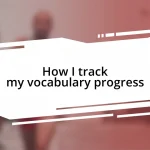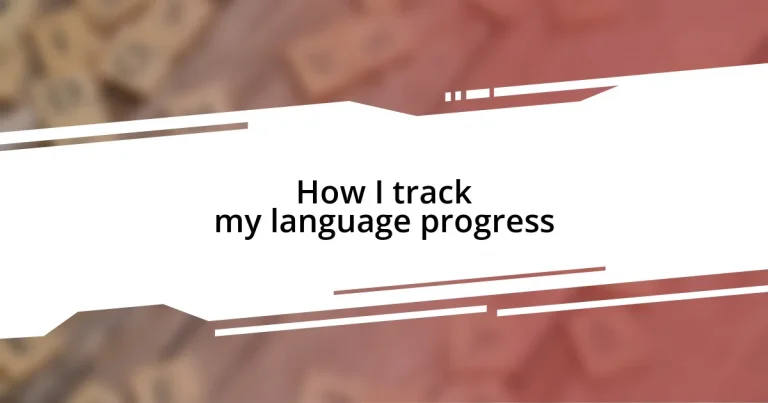Key takeaways:
- Identify and evolve language learning goals to maintain long-term motivation, focusing on personal interests.
- Use a variety of tracking methods, including journals, digital tools, and conversational practice, to gain insights into progress.
- Incorporate visual progress charts with short-term goals and color-coding to enhance motivation and focus areas for improvement.
- Stay motivated through community support, fun challenges, and self-rewards for achieving milestones in learning.
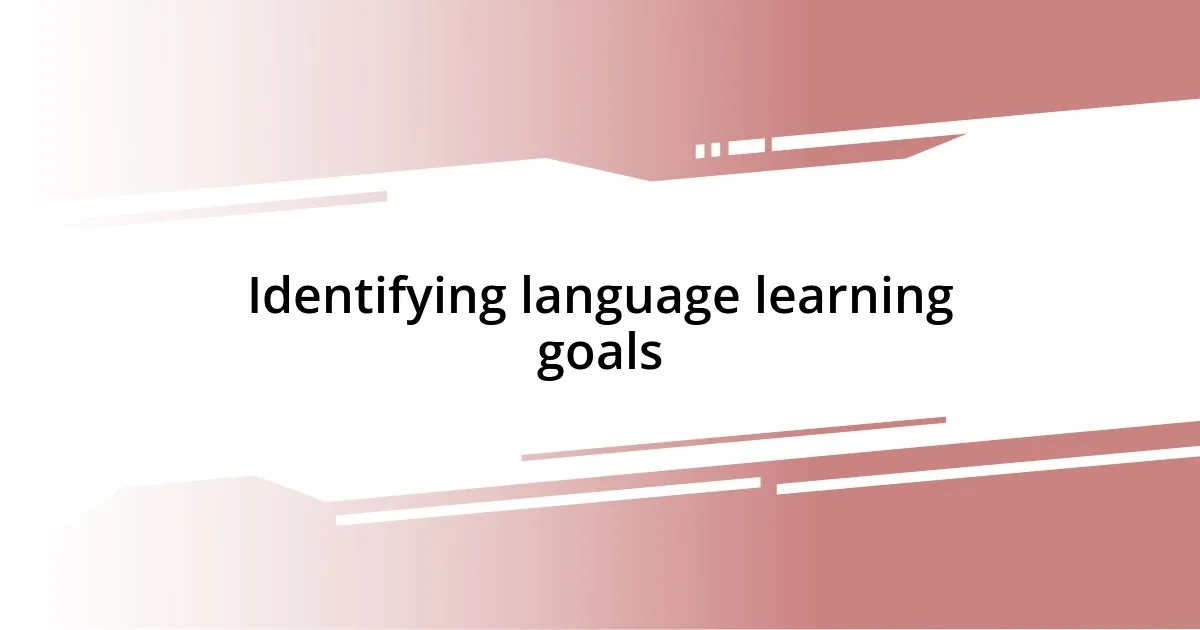
Identifying language learning goals
When I first started learning a new language, my initial goal was simply to hold a basic conversation. It felt exhilarating to express myself, even if my words were sometimes clumsy. Have you ever felt that rush from communicating in a different language? It’s these small victories that keep me motivated.
As I progressed, I realized that my goals needed to evolve. Instead of just chatting, I aimed to read books and watch films in the target language without always needing subtitles. Setting these specific, measurable objectives helped me track my progress in a tangible way. Have you thought about what milestones would excite you? Identifying those turning points is crucial for sustaining long-term motivation.
Reflecting on my journey, I’ve learned the importance of making my goals meaningful. Crafting your learning objectives around personal interests—like travel, food, or culture—makes the process much more enjoyable. Think about what resonates with you; it’s those personal connections that will enhance your commitment to learning. Remember, the journey isn’t just about the destination; it’s about savoring every step along the way.
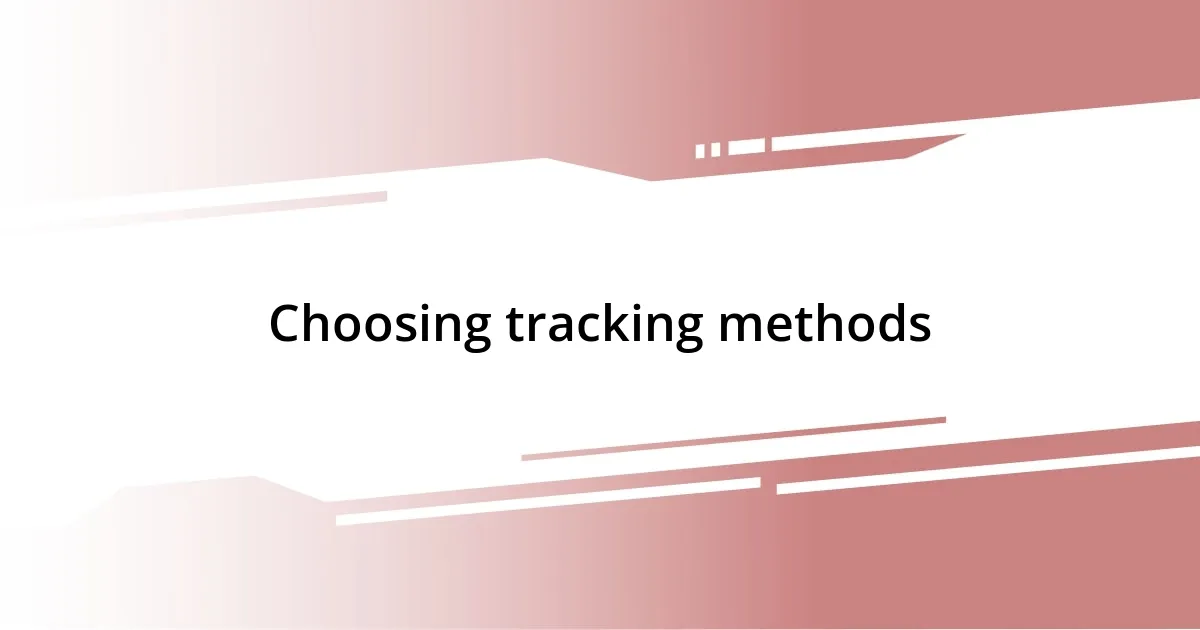
Choosing tracking methods
When it comes to tracking my language progress, choosing the right method is essential. I like to mix different approaches, as they each offer unique insights. For instance, I often use journals to reflect on my daily learning experiences, which helps me pinpoint what strategies work best for me and what aspects I might still struggle with. Have you ever considered how writing something down can clarify your thoughts?
Digital tools are another favorite of mine. Apps like Duolingo not only track my daily streaks but also provide immediate feedback on my performance, which feels rewarding. I’ve noticed that when I receive instant gratification from these small achievements, it fuels my motivation. It’s a simple yet effective way to visualize progress!
Finally, I find that having conversations with native speakers is invaluable. Recording these sessions allows me to listen back and identify areas for improvement. It’s both thrilling and nerve-wracking to communicate authentically; these moments truly showcase my growth. The combination of these methods gives me a comprehensive view of my journey.
| Method | Benefits |
|---|---|
| Journals | Promotes self-reflection, identifies strengths and weaknesses |
| Digital Tools (e.g., apps) | Provides instant feedback and tracks progress visually |
| Conversational Practice | Enhances real-life application and boosts confidence |
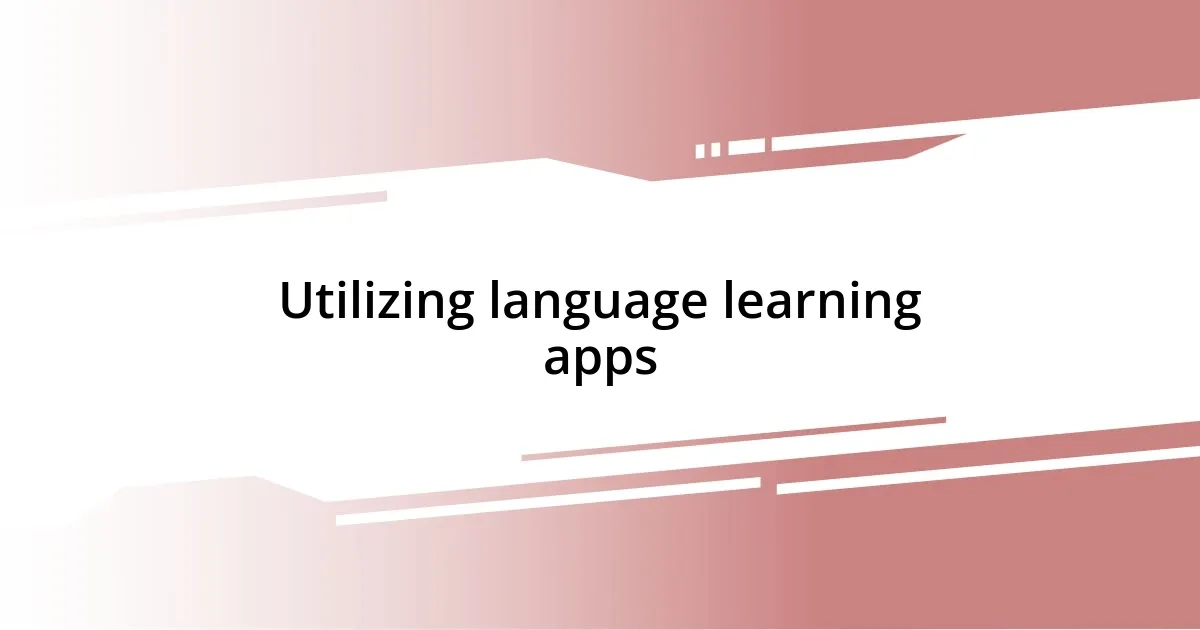
Utilizing language learning apps
While I enjoy various methods for tracking my language progress, utilizing language learning apps has become a crucial aspect of my routine. They offer a blend of convenience and engagement that really resonates with me. I remember starting with an app, excited by the gamified elements like earning badges and leveling up. It turned an otherwise daunting task into a fun challenge, making consistent practice feel rewarding rather than tiresome.
Here are a few standout benefits of language learning apps that I’ve experienced firsthand:
- Structured Learning Paths: These apps often break down lessons into manageable chunks, allowing me to focus on one piece at a time.
- Immediate Feedback: I love getting instant correction on pronunciation and grammar, which helps me avoid forming bad habits.
- Customizable Content: Some apps allow me to tailor my learning experience based on my interests—like focusing on travel phrases when prepping for a trip.
- Community Interaction: Many apps feature forums or chat functions where learners can connect, providing a supportive community that enhances motivation.
Overall, I find that immersing myself in these interactive environments keeps my language journey dynamic and enjoyable. Whether it’s a quick five-minute session or a longer study block, I always feel a sense of accomplishment after using these apps.
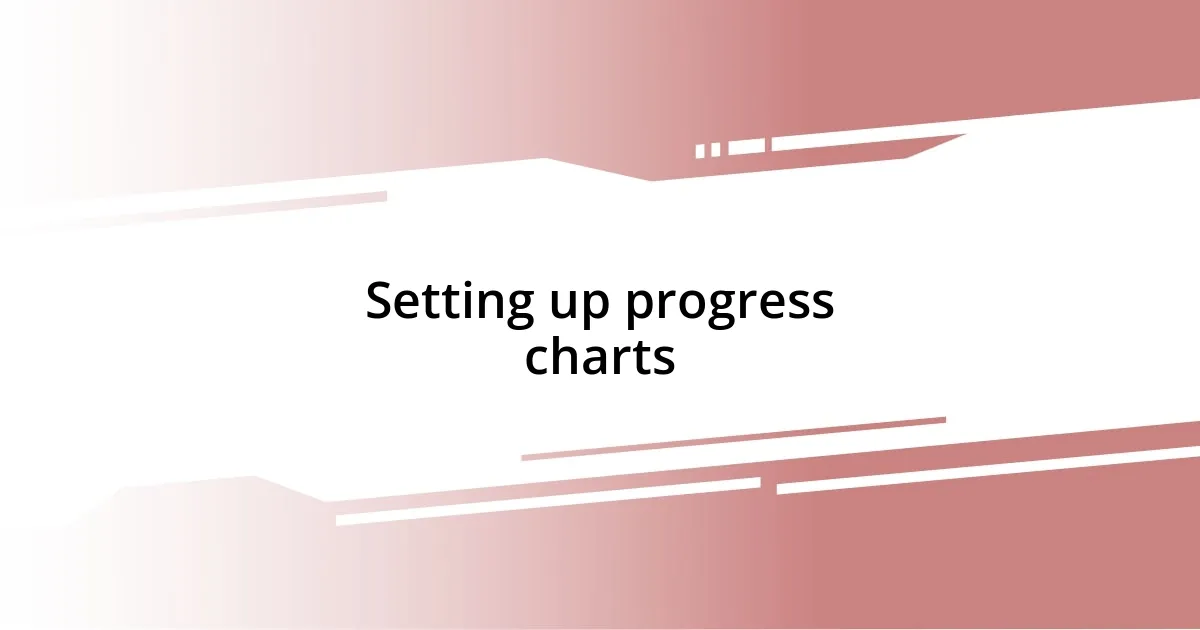
Setting up progress charts
Setting up progress charts is an essential part of my language learning experience. I remember the first time I created one; it felt incredibly satisfying to see my achievements laid out visually. Utilizing a simple grid format, I can track vocabulary acquisition, grammar mastery, and conversation milestones. Have you ever noticed how seeing progress on paper can amplify your motivation?
In my experience, color-coding has been a game-changer. For instance, I use green for skills I’ve mastered, yellow for those in progress, and red for areas that need attention. This visual representation not only makes my charts more engaging but also helps me quickly identify where I should focus my efforts next. It’s a reflection of my language journey that creates an ongoing dialogue with myself about my improvements.
Another aspect I cherish is incorporating short-term goals within my charts. For example, I might set a target to learn ten new words each week or to hold a 5-minute conversation with a native speaker. When I check off these goals, it fills me with a sense of accomplishment that fuels my passion for language learning. What goals do you think would motivate you in your own journey?
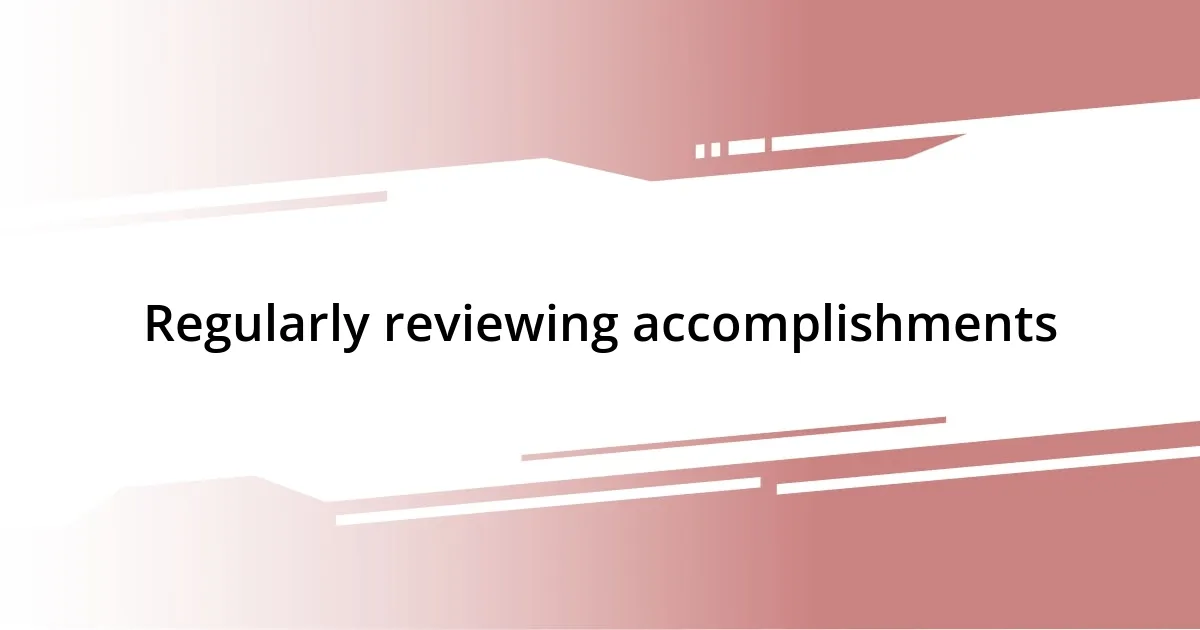
Regularly reviewing accomplishments
Regularly reviewing my accomplishments has become a cornerstone of my language learning process. After a particularly challenging week, I sit down to reflect on what I’ve achieved. You wouldn’t believe how much recognizing even small wins—like mastering a tricky pronunciation or completing a challenging lesson—can uplift my spirits and keep me motivated. Have you ever felt that rush of satisfaction when you acknowledge your progress?
I often set aside time each month to review my progress—not only in my charts but also in my overall confidence. I remember the first time I went back through my notes and realized I could hold basic conversations with friends. It struck me that my efforts, no matter how small, were truly paying off. There’s something powerful about affirming your journey; it reaffirms why you started and propels you forward.
In my experience, combining self-reflection with goal-setting creates a potent cycle of growth. For instance, if I notice I’ve consistently struggled with verb tenses, I make it a priority to focus on that area in the coming weeks. This intentional assessment helps me adapt my learning strategy, ensuring that I’m continuously meeting my evolving needs. So, how can you make your review process work for you?

Adjusting techniques as needed
Adjusting my techniques is crucial to my language learning journey, especially when I notice I’m plateauing. Recently, I realized that my vocabulary retention had slipped. Instead of feeling defeated, I decided to switch up my methods; I started using flashcards in conjunction with spaced repetition and found it to be incredibly effective. Have you ever felt like a technique just isn’t hitting the mark? Changing things up can breathe new life into your learning process.
Sometimes, it’s about identifying what worked well before and applying it again. Early on, I experimented with immersive listening—like tuning into podcasts or watching movies in my target language. After a period of using more traditional study methods, I felt that spark of enjoyment missing. Reintroducing these immersive practices reignited my passion and made learning feel less like a chore. How about you—do you have techniques that once inspired you but have since fallen by the wayside?
I also adjust my learning environment based on what feels most productive. For instance, I’ve discovered that studying outdoors in a café enhances my focus, compared to the confines of my home. This simple change in scenery created a refreshing break that motivated me and even sparked conversations with strangers. Isn’t it interesting how our surroundings can significantly influence our learning effectiveness? Adapting not only my methods but also my environment has led to surprising improvements.
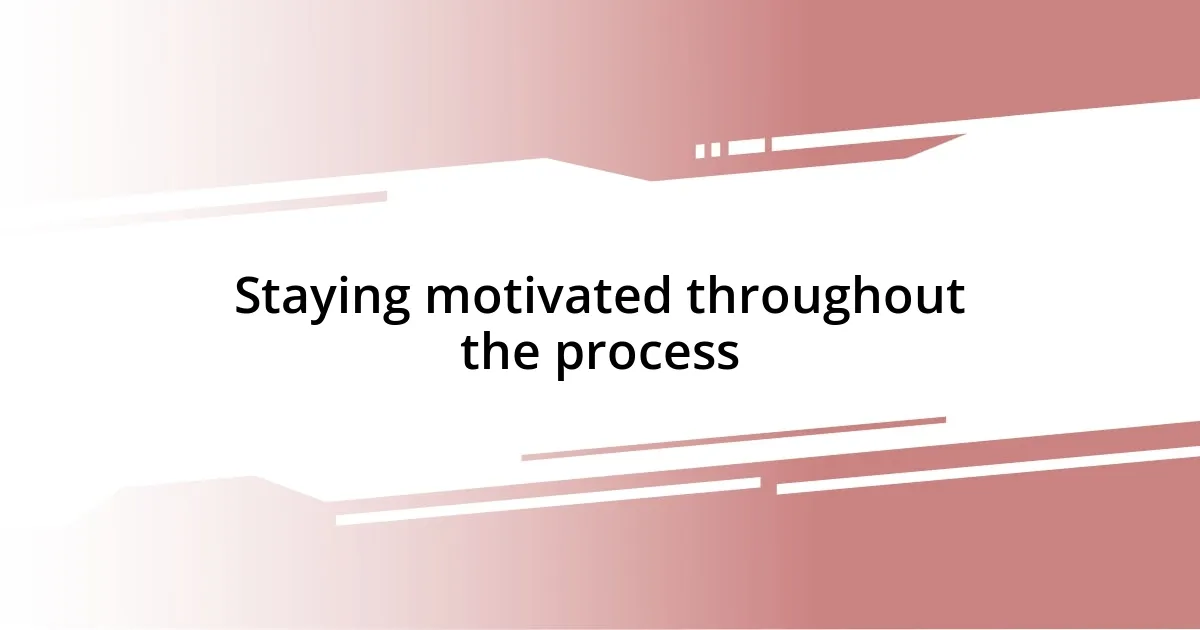
Staying motivated throughout the process
Finding ways to stay motivated in my language learning journey has been essential for me. For instance, I started joining online communities where learners share their experiences and tips. When I receive encouragement from others or see someone else’s progress, it fuels my own ambition. Have you ever felt inspired by a peer’s success? It’s incredible how mutual support can lift us, isn’t it?
I also set small, fun challenges for myself to keep things exciting. Recently, I decided to learn a new song in my target language and sing it karaoke-style with friends. Not only did this challenge push me to learn new vocabulary, but it also turned out to be a hilarious evening. The laughter and shared experience made the effort worthwhile, solidifying my commitment to keep going. Don’t you think incorporating joy into learning can make a big difference?
To stay motivated, I enjoy rewarding myself for reaching milestones. Each time I complete a significant goal—like finishing a language course or having a conversation with a native speaker—I treat myself to something special. It’s a fantastic way to celebrate progress! The anticipation of rewards keeps me focused on my journey. What kind of rewards motivate you? It can be anything that makes you feel accomplished and drives you to continue your learning path.










